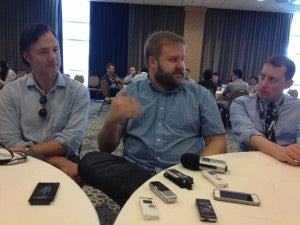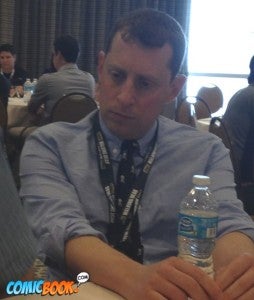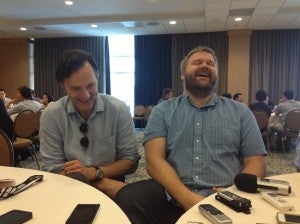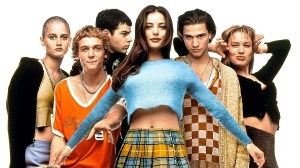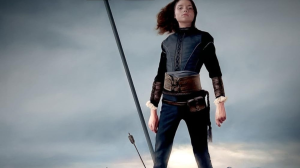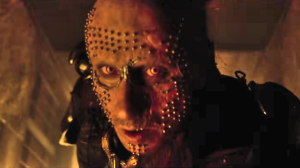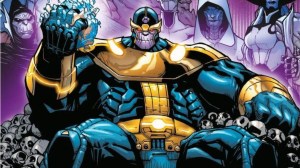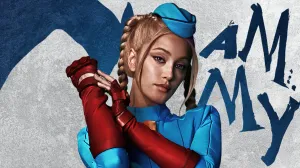This past weekend at San Diego Comic Con International, ComicBook.com had an opportunity to sit down at a small press roundtable with a number of the stars of AMC’s hit series The Walking Dead.Based on the Image Comics/Skybound comic book series of the same name by Robert Kirkman and artist Charlie Adlard, The Walking Dead will launch its fourth season this October on AMC; last year it became the first cable series ever to post, over the course of its season, the best ratings of any show on TV including broadcast hits like The Big Bang Theory and NCIS.The series is perhaps best known for its maxim that “no one is safe,” something we discuss a bit below.Kirkman, along with the showrunner Scott Gimple and series villain David Morrissey (the Governor), joined us at the roundtable for a discussion on the upcoming season. You can check it out below, with reporters’ questions in bold and italic and the answers labeled by speaker.You can also see our previous roundtable with Norman Reedus, Danai Gurira and Greg Nicotero here.What go you creatively energized for the new season?Robert Kirkman: For me, The Walking Dead is about building. You’re starting out on season one, it’s very cool. You’re going to do cooler stuff in season two, cooler stuff in season three. By the time you get to season four, the world is changing, the characters are changing. I feel like Carl is getting a lot more interesting; I feel like Rick is getting a lot more interesting. I feel like there’s very cool stuff coming up for Michonne.I can’t specify but I know the things that we’re picking and choosing from the comics that we’re getting to and it’s like, when we finally sit down to get to work on season four, “Ohh, we’re finally going to get to this! People are going to crap when they see that we did this!” So that stuff is really exciting. I just get really energized knowing that we’ve been doing this for four years now and we’re going to get to tell this story. I mean, this is the zombie movie that never ends. It’s about these characters growing and changing over time and watching Rick Grimes going from being this small-town sheriff to being this grizzled maniac. And we’re actually getting there in the show, which is really cool.One of the biggest changes was the survival of the Governor in the TV show. What made you decide to do that?Kirkman: Eh, it’s something about that actor. We liked him…David Morrissey: He’s cheap.Kirkman: [Laughs] He’s not. But, uh…unless I’ve heard wrong?You never want to do the expected. I feel like a lot of cable shows would bring on a fantastic actor like David Morrissey and do a really cool character like the Governor and it’s like, “Alright, great, I can’t wait to see how this guy dies or is written out of the show at the end of this season. And it becomes this sort of cable show trope and the fact that we’re able to keep him on the show and do more cool stuff with him I think keeps people guessing and keeps us doing new and interesting and crazy things.And I think that when you see what we do with him in season four, you’ll be like, “Oh, yeah, that is a great reason to keep that guy around.” It’s going to be some really cool stuff.David, was it cool for you to find out that you would be coming back, knowing your other-world fate? Were you kind of anticipating not coming back?Morrissey: The one thing about working on TWD is you learn not to anticipate anything. It’s that thing. You wait for each episode to come out and if you’re alive, it’s just such a bonus because I love working on it.Kirkman: Do you guys ever read those scripts, and–Morrissey: Oh, you do. We all disappear to our trailer and then we come out and there’s one door still closed and we’re like, “Oh.”But I actually think that frisson is what adds to the show because no one is safe. That’s the truth we live in is that you don’t want a show where it has this premise and then all the leads are always alive. But it’s just such a blast to do.This season is exactly the same. It’s been such a wonderful season so far for us to film, you know? It’s great. What they’re coming up with is very surprising.I think that’s the main thing in season four is you’ll be very surprised by I think many of the characters’ developments. People do things and you think, “God, I’d never think of it.” That’s what I love about it. Other characters that maybe have been less at the forefront of the stories in the past, they step up and they’re just great.In the beginning of the last season the Governor was a little bit off but you’re like, “Oh, he’s just looking after his people.” But by the end he was just downright scary.Morrissey: He was looking after his people in the end! What are you talking about?No, I think the thing is that at the end of the third season he was in a very psychotic state. I don’t think he dealt with that in any lightness. He didn’t do the action of killing his townfolk without consequence.What happens in season four is him dealing with those consequences. But how he deals with them–whether he deals with them in an even darker way or whatever, you’ll have to wait and see but he’s not able to wear it lightly. It takes its toll on him and it costs something inside him. You have to see what that cost is.The characters don’t do the violence and just walk away without any emotional impact on them. It all has a cost. Some of them wear it well and some of them don’t, but it definitely has a cost on him.Was it a pleasant surprise to be brought back as a series regular? You not only read that script and find out you’re still alive, but then you’re a regular so theoretically you don’t come back in the first episode and get blown away.Morrissey: Theoretically. [Laughs]You know what? Every minute you have on The Walking Dead is a bonus. I love it. The actors will all tell you the same thing. It’s a great show to work on; it’s a show where you never open a script and think in a negative way, “How am I going to make that work?” Sometimes as an actor you get scripts and it’s like, “No one talks like that. How the hell am I going to make that work?” You never have that dilemma. Your dilemma is you’re looking at the writing and going, “How am I going to release this? How am I going to get this off the page? What am I going to bring to this?” It’s down to you. You’re given a present and now you have to use it, so that’s what the challenge of the show really is. So every minute you’re on that set is a bonus–for me and for the other actors.I was asked last season about the show, and I said “You know what? I’d make the tea for this show. I would actually get there and make coffee for everybody.” I love being there. I know it sounds like crap actor talk, but it’s absolutely true. I’ve been on a lot of shows and this show just–it’s not even a plan, it’s just the way the stars fall. It starts with Robert but all those elements all along the way.For me and my department, it’s Andrew Lincoln. He leads from the front, you know? When he goes to work, he goes to work in a way that’s so committed, so all-encompassing; he doesn’t close off from people, he leads from the front and he sets an example as the leading actor. So that’s great, and no one comes on the show and sees the leading actor sort of not turning off or giving bad times to people or being discourteous; it’s absolutely professional and wonderful and then the cameras turn and you’re like, ‘This guy’s brilliant!’ So you’ve got to step up to that–all the actors feel that.Last season we split time between Woodbury and the Prison. Now that Woodbury is gone but the Governor is still out there, will we have a similar format?Kirkman: I think there’s going to be a similar element done in a very different way. I think there will be almost a new format to the way the story’s told in the same way that season three had a new format. That’s all we’ll say.Robert, as a guy who came up from being a guy who loves comic books and pop culture…Kirkman: …to a guy who hates comic books and pop culture?…Well, what’s it like to see your creation on the sides of buildings and zombies walking through the streets in tribute to your creation?Kirkman: It’s really strange, I don’t know. I tell people from time to time that I only set out to make a living writing comics. I only wanted to write comics. The fact that I can pay my mortgage from a room on my house while I’m typing on a keyboard working on a medium that I love was the only thing I ever tried to achieve and the fact that I achieved that and all of this other–I call it stupid stuff–that I never expected…I never wanted a TV show. I was never like, “Oh, my God, I hope this turns into a TV show.” I really loved comics, so the fact that it was a comic is enough but it’s just beyond my wildest dreams and it’s just very weird.I’m very pessimistic and very negative most of the time and so I’m very happy that my kids are probably going to be okay and I’m probably not going to be starving anytime soon, so that’s good but I don’t know how to read it. It’s definitely bizarre. When a zombie tries to scare me on the street in San Diego and it’s a zombie promoting a show based on my comic and they have no clue? I went by the AMC panel yesterday and they were like, “Can I go by this door?” They were like, “Sorry, sir, you have to go wait in line over here.” I was like, “Aright, alright…”There are people intimately involved in my thing who have no idea who I am. It’s great.

